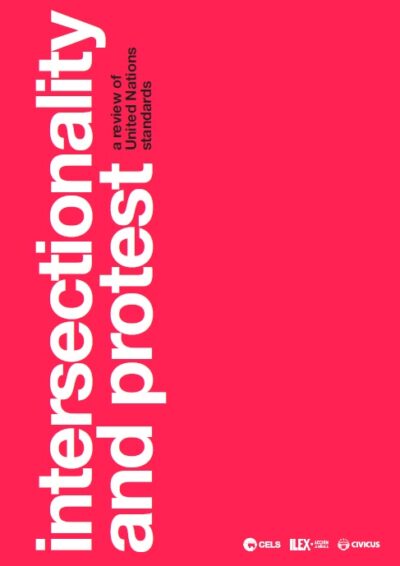We denounce the intelligence agency in Argentina for enabling illegal activities
We filed a criminal complaint against the highest authorities of the State Intelligence Secretariat (SIDE) for abuse of authority. The National Intelligence Plan and the operational order that came to light in recent days violate the law.
El Salvador: New Foreign Agents Law Threatens Rights and Freedoms of Civil Society Organizations and the Media
More than twenty regional and global organizations urge the OAS to condemn the new legislation as a democratic setback. We, in turn, call on the Trump administration not to support these measures and on the Bukele administration to repeal the law in order to comply with its international obligations.
2024 IACHR Report: Human Rights in Argentina
Deterioration in the right to protest and freedom of expression, rollback of memory policies, weakening of protections for LGBTIQ+ rights, austerity measures affecting pensioners, and a rise in child poverty, are among the critical issues the Commission warned about in its annual report. We summarize the Commission’s key findings.
Press Freedom is Under Threat
In a short time, Javier Milei’s government has cemented a difficult scenario for journalism in Argentina through the closing of public media outlets, the discretional use of state advertising, and authorities’ stigmatization of and aggression against journalists. Such obstacles to freedom of the press undermine democracy.
Detention of Migrants in the maximum security prison of El Salvador: Urgent appeal to the UN
Labeled as terrorists without any judicial process, at least 260 people were deported from the US and detained in the Salvadoran CECOT after an agreement between Trump and Bukele. Together with organizations from around the world, we call on the UN Security Council to investigate the situation and demand the releases
Argentina must protect social mobilization, not silence it
More than 35 international and regional organizations call on the argentine government to comply with its international obligations on the right to protest and to investigate the police action on March 12. They also express their solidarity with the demand of decent pensions and concern about the rise of authoritarianism in Argentina.
Repression as policy: Violence, arbitrary detentions, and the use of dangerous weapons in Argentina
The mobilization outside Congress demanding a pension increase on March 12 was violently repressed in a large-scale operation involving five security forces. Security Minister Patricia Bullrich had warned in advance that there would be repression. Tear gas, rubber bullets, and arbitrary detentions marked a day in which the government justified its actions by invoking the narrative of an “attempted coup.”
UN: we denounced the restrictions on civic space and the unconstitutionality of the IMF loan at the human rights council
During the 58th session of the Human Rights Council, CELS participated in two interactive dialogues with Special Rapporteurs to present on the current situation in Argentina.
Petition for the Declaration of Unconstitutionality of the Appointments of Lijo and García-Mansilla
The decree in question constitutes a clear violation of the National Constitution and a serious affront to the separation of powers and judicial independence. In response, together with the Civil Association for Equality and Justice (ACIJ), the Institute for Comparative Studies in Criminal and Social Sciences (INECIP), and Poder Ciudadano, we filed an action for constitutional protection (amparo).
IACHR Hearing: State fails to address refugee and asylum issues
CAREF, CELS, and the Jesuit Migrant Service (SJM) called on the Inter-American Commission on Human Rights (IACHR) to urge the Argentine government to repeal Decree 942/2024, as it undermines due process guarantees and the right to seek and receive asylum. Furthermore, we emphasized that the State must uphold its obligations regarding the rights of refugees and asylum seekers and, in particular, ensure the competence of the officials responsible for adjudicating asylum claims.
IACHR Hearing: State denies responsibility for December 2001 killings and repression
The Argentine State withdrew its previous acknowledgment of responsibility for the repression carried out in 2001, which it had accepted in 2023. Officials declined to answer questions regarding the State’s new assessment of the events that occurred in December 2001. The events of December 19 and 20, 2001, were an extreme manifestation of state violence following the unjustified declaration of a State of Siege.
Intersectionality and protest
Autor/a: CELS, ILEX, CIVICUS
16 pages
ver más
Julio García Romero vs. Ecuador: CELS and RFK Human Rights appear as amicus curiae before the Inter-American Court of Human Rights
The case was heard in a public hearing nearly 20 years after the Chilean journalist’s death, caused by tear gas used by Ecuadorian police during a protest crackdown.

Special Report: Milei. Year One.
Autor/a: CELS
ver más
For the land: A documentary series about agribusiness and human rights
Four episodes, four countries, four stories that show how the use of pesticides affects health, access to land and environment of different communities in Argentina, Bolivia, Paraguay and Brazil.
IACHR: Argentina’s government appears aggressive and ill-prepared in hearings on human rights protections
The representative from the La Libertad Avanza administration claimed poverty is decreasing but could not provide any specifics regarding social policies for children and adolescents. Nor did he address the provision of medical supplies to guarantee sexual and reproductive health. Additionally, he denied the existence of gender-based violence. During the hearing on memory policies, he attacked human rights organizations, accusing them of seeking revenge for the last military dictatorship.



